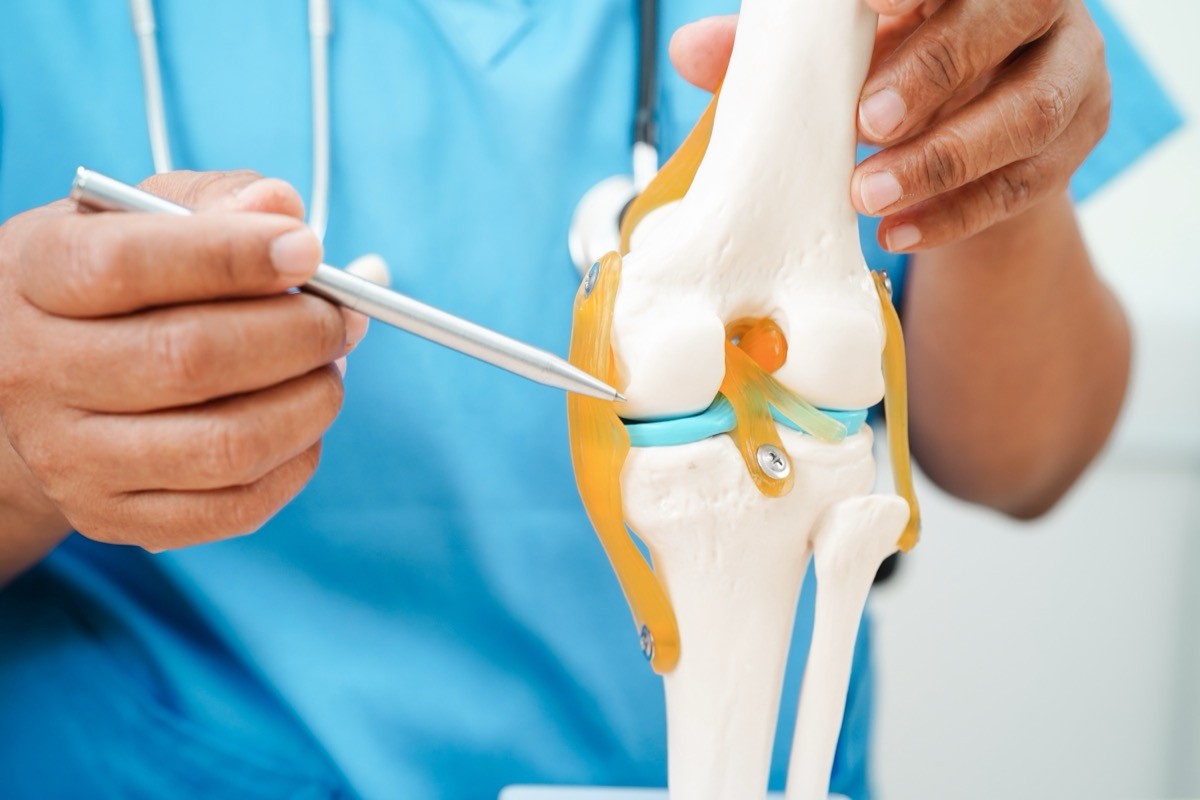7 Amazing Vitamin K Benefits for Your Health, According to Doctors

Naturally found in foods such as leafy greens, cruciferous vegetables, nuts, meat, and certain oils, vitamin K benefits bodily functions from your bones to your blood sugar.
The National Institutes of Health (NIH) recommends that adult women consume 90 mcg of vitamin K daily and men 120 mcg. However, some people may find it difficult to get enough of this essential nutrient from their diet alone, especially seniors, those with underlying health concerns, and those with dietary restrictions that could curb their intake of vitamin K-rich foods. In this case, it’s a good idea to ask your doctor whether a vitamin K supplement could help you address any gaps in your nutritional intake.
In fact, increasing your levels could offer a bevy of positive health outcomes, doctors say. Read on for the seven biggest vitamin K benefits.
RELATED: 8 Surprising Vitamin D Side Effects, According to Doctors.
1
Vitamin K supports healthy blood clotting.

Within the first hours after a baby is born, doctors administer a vitamin K shot as a protective measure to prevent uncontrolled bleeding. That’s because without dietary vitamin K, infants can develop a vitamin K deficiency that can prevent their blood from clotting if a bleed should occur.
Adults can also support healthy blood clotting by increasing their vitamin K intake, says Raj Dasgupta, MD, a quadruple board-certified physician and the chief medical advisor for Garage Gym Reviews. “Vitamin K is essential for producing clotting factors that help stop bleeding when you get injured. Without enough of it, your body can’t form clots properly, which can lead to excessive bleeding even from minor cuts or bruises,” he explains.
Jennifer Habashy, NMD, a naturopathic doctor and the assistant medical director at Claya, adds that supporting healthy clotting is in fact one of vitamin K’s most well-known benefits: “It activates proteins that help prevent excessive bleeding, making it essential for wound healing and overall circulatory health.”
2
Vitamin K promotes stronger bones.

Vitamin K insufficiency has also been linked to low bone density and higher fracture risk, meaning your bone health also stands to benefit from upping your vitamin K intake.
“Vitamin K helps activate osteocalcin, a protein produced by osteoblasts, the cells responsible for building bones, making them stronger and more resilient. This is important for maintaining bone density and reducing the risk of fractures, especially as you age,” says Dasgupta. Prothrombin is another vitamin K-dependent protein that can help you build stronger bones.
RELATED: 21 Surprising Signs You Have a Vitamin Deficiency.
3
Vitamin K supports healthy blood sugar levels.

Dasgupta says that if you are at risk for Type 2 diabetes or metabolic disease, increasing your vitamin K intake could help offset that danger.
A 2020 study published in the journal Nutrients suggests that vitamin K “plays an important role in the regulation of the glycemic status. Supplementation of vitamin K may reduce the risk of diabetes mellitus and improve insulin sensitivity. They add that vitamin K may help “suppress the progression” of diabetes in those already diagnosed.
4
Vitamin K could support immune function.

Several studies have suggested that vitamin K could help fortify your immune system. In fact, a 2019 study says that vitamin K acts as a “cofactor for some plasma proteins, thereby affecting immune and inflammatory responses particularly mediated by T cells.”
Additionally, vitamin K can reduce the production of pro-inflammatory cytokines which play a role in infection, injury, and other inflammatory conditions. This means that besides helping you fend off everyday illness, it could also help protect against cancer, hypertension, autoimmune disease, and other conditions impacted by chronic inflammation.
5
Vitamin K might boost your cognitive health.

Emerging evidence suggests that adequate vitamin K levels might support cognitive health, particularly as we age. In fact, a 2022 study found that having a higher brain concentration of MK4, a form of vitamin K2, was associated with 17 to 20 percent lower odds of dementia or mild cognitive impairment.
“Research suggests that vitamin K supports brain health by influencing the metabolism of sphingolipids, essential fats that protect brain cells,” explains Habashy. “Higher levels of vitamin K have been linked to better memory and cognitive performance.”
RELATED: Doctor Reveals the No. 1 Supplement to Take If You’re Getting Older.
6
Vitamin K could improve your skin.

Consuming more vitamin K may also come with certain aesthetic benefits by improving your skin’s health and appearance.
“Due to its role in promoting proper blood circulation and reducing inflammation, vitamin K may help minimize dark circles, bruising, and skin redness,” says Habashy. “It is often used in skincare products to support healing and recovery.”
7
Vitamin K may protect heart health.

Some research suggests that certain vitamin K-rich foods could also help protect against heart disease.
“Vitamin K helps prevent arterial calcification by regulating calcium deposition in the blood vessels. This reduces the risk of heart disease and keeps arteries flexible for better cardiovascular function,” explains Habashy.
However, according to the American Heart Association (AHA), just one vitamin K-rich food appears to have this beneficial effect over heart health: “Natto, a traditional Japanese food made from fermented soybeans, is high in vitamin K2,” and could help prevent plaque buildup in the arteries, they say.